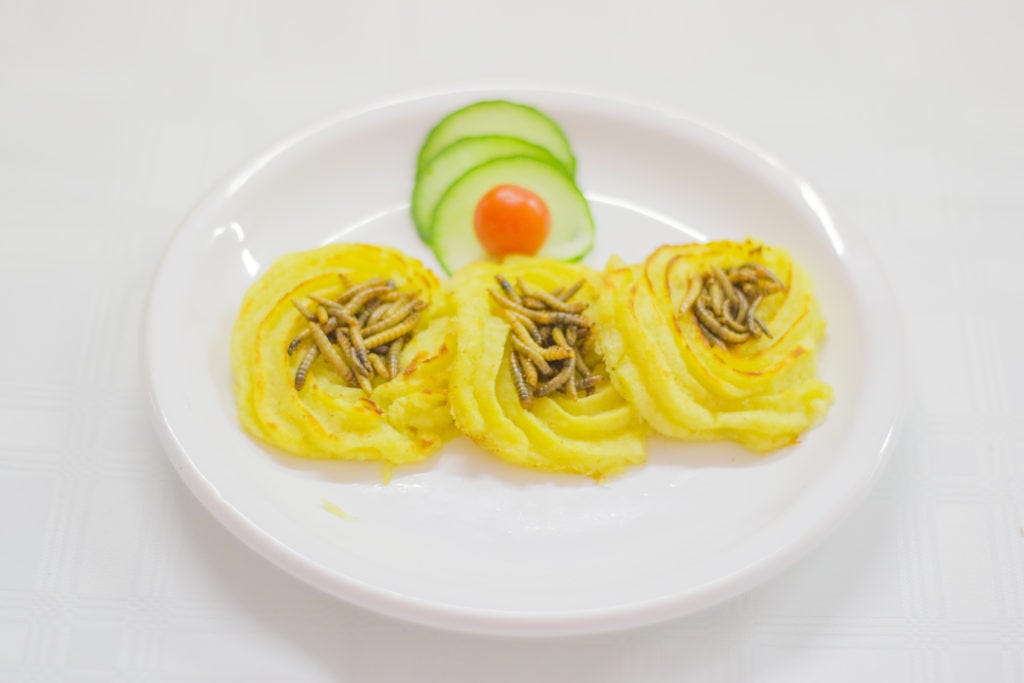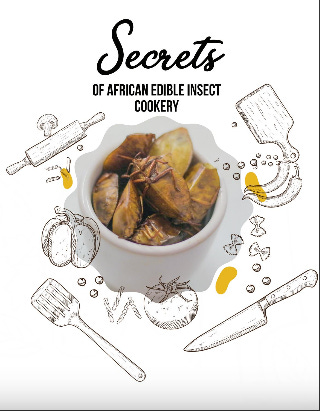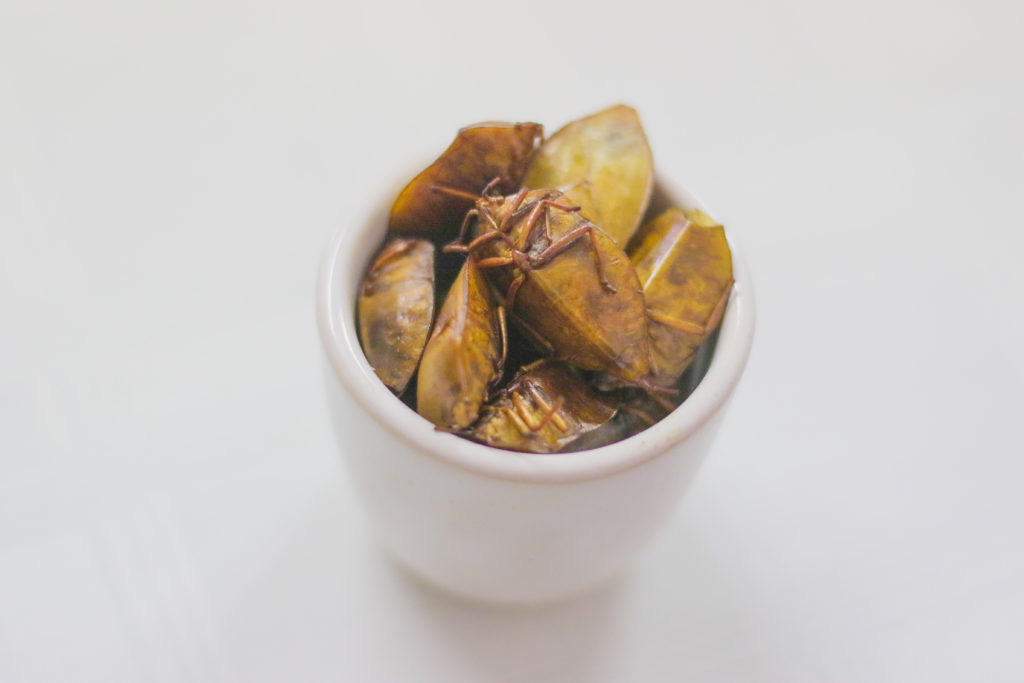What a Bug
A newsletter about food systems, climate change and everything connected to them
It’s Critters Time
Fancy some Stink Bug Ginger Nuggets or Grasshopper Emulsion with Cream? Or how about a plate of Termite In The Hole or Mopane Worm Scones? Taking advantage of our rising interest in insects as a more environmentally-friendly protein, two new cookbooks funded by the Swedish International Development Cooperation Agency (Sida) showcase the long but waning tradition of cooking with insects in the southern parts of Africa.
Secrets of African Edible Insect Cookery grew out of a project partnership with Zimbabwe’s Chinhoyi University of Technology. The 25 recipes featured here are simple - the Ground Cricket Loaf will be a cinch to anyone who’s honed their banana bread skills during last year’s lockdowns while the Termite Porridge has only four ingredients.
As I flipped through the book online, I thought about all the termites that used to torture the residents of Yangon during the long, damp months of monsoon by eating away at our previous books and paintings and wished I’d gotten my hands on some of these recipes sooner.
Les Délices de Mikese (“Mikese’s Delicacies”) aims to document the recipes and knowledge held by women in DRC and is said to be the first book “conceptualized and written (almost exclusively) by African women about their own culinary heritage and know-how”.
It’s in French and my language skills there haven’t moved on from the most basic tourist phrases so I can’t say what’s in there, but funders say it showcases recipes from female chefs and includes delights such as “mukata fruits aux chenilles” (“fruit mukata with caterpillars“) and “velouté de courges aux mposes” (“squash velouté with palm moth larvae”).
No, Not This One
A moth specie that could ruin wines? Say it isn’t so. But Lobesia botrana or more commonly known as European grapevine moth is just that. The invasive species was apparently ‘accidentally’ introduced in South America in 2008 and has been causing headaches to wine growers in Chile and Argentina by not only reducing yields but also leaving a foul taste on the resulting wine.
A friend and fellow foodie alerted me to this promo video from an Argentinian company called ISCA that offers integrated pest management solutions, which essentially involves shunning chemical-laden pesticides in favour of more holistic and environmentally-friendly strategies.
What’s their solution for this wine-destroying moth? Confusing the male moths so they won’t get a chance to mate! The company say its product - a thick, biodegradable liquid - can be sprayed from planes and drones and once it lands on the foliage, the droplets slowly release the appropriate amount of sex pheromone for about 45 days. Too much of a good thing - in this case, an overabundance of sex pheromone in the field - confuses the male moths who end up dying without ever mating. This leaves the females to lay sterile eggs, from which few hungry caterpillars emerge, we’re told.
This is, of course, just one of many efforts to control pests by managing their sex lives. I worked on this little video with a cameraman on how scientists are trying to eradicate fruit flies in a similar manner, but using nuclear technology. However, with some research showing that this European grapevine moth population is set to increase as a result of global warming, these controls might become quite important.
An Uplifting Break
If you, like me, have become exhausted by a combination of COVID-19 lockdowns, coup (see last week’s newsletter) and just general sorry state of the world, here are two links you should look through the weekend to restore some faith that not everything is going to the (insert your dreaded place here).
The World Resources Institute’s Face of Restoration highlights five people who are taking a radically different approach to restoring forests and farms in Brazil’s Amazon and Atlantic forests. They are growing native trees, embracing agroforestry and rejecting slash-and-burn farming. There haven’t been many positive stories about forest restoration in Brazil so these beautifully-produced videos and articles make for a nice change.
Then there’s the Global Alliance for the Future of Food’s Beacons of Hope project, which showcases global initiatives working to achieve sustainable, equitable, and secure food systems. These projects span all across the world and their latest additions in February focuses on an organisation in Toronto and another in Quito.

Voluntary Guidelines Adopted
Continuing with an uplifting theme, the U.N.’S Committee on World Food Security’s adopted the Voluntary Guidelines on Food Systems and Nutrition during its annual meeting this week.
Yes, the clue is in the title - voluntary guidelines - which means they are not legally binding for member states and the CFS can’t really dish out penalties or awards if countries don’t or do take them up. But it has been in the works since 2015, has held consultations and negotiations with a wide range of stakeholders and is a key reference product in the run up to the Food Systems Summit later this year.
It wasn’t all smooth sailing though. Devex’s Teresa Walsh reported that a debate among delegates and stakeholders that was “meant to focus on proposals for promoting the dissemination, use, and application of the (guidelines)… instead led to disagreements among member states around language in the document that had already been approved”.
“Delegates nearly reopened negotiations to make revisions to the text, and members of the civil society mechanism expressed their discontent with some aspects of the process,” she added.
If you have more time on your hands….
Here’s an interesting story about Singapore’s plan to build a massive, eight-story indoor fish farm. The tiny island nation imports most of its food so it’s not a surprise they’re looking at ways to become more self-sufficient, but they’ve also been encouraging the growth of home-grown AgTech companies. I wrote here about some of their start-ups that are working on things like alternative proteins to products that lower the glycemic index of food. Thanks to Numlock News’s Feb 9 newsletter for the tip on the fish farm.
Marion Nestle is a guru when it comes to food policy and public health advocacy. She has written numerous books on the topic and also runs the Food Politics blog which is a delight if you’re into that sort of thing (I am). And no, she’s not related to that company. She has a long-running series called “Annals of industry-funded research” that pretty much names and shames the kind of research that contributes little to science but does much to confuse ordinary consumers. This week she takes on the The Peanut Institute Foundation.
Have a great weekend! Please feel free to share this post and send tips and thoughts on twitter @thinink, to my LinkedIn page or via e-mail thin@thin-ink.net.






